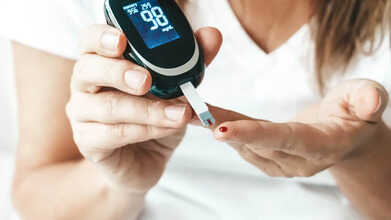- Health Conditions A-Z
- Health & Wellness
- Nutrition
- Fitness
- Health News
- Ayurveda
- Videos
- Medicine A-Z
- Parenting
- Web Stories
Health Tests To Do Before Diwali For A Safe And Stress-Free Festive Season

Credits: Canva
Diwali season is here, which brings with it the joy of celebrations, endless sweets, and festive food, all of which make this time of year so special. But to enjoy it fully without health worries, it is important to keep a check on your wellbeing with a few basic tests.
As the festivities begin, it is natural to get carried away with indulgent meals, late nights, and social gatherings. However, a few simple blood tests before Diwali can help you stay active, balanced, and ready to celebrate without any setbacks.
Why You Should Get Tested Before Diwali
Surrounded by all the happiness and excitement, many people tend to overlook their health during the festive season. This often leads to avoidable health issues that can interrupt the joy of celebrations and take away from the festive mood.
These problems usually stem from a few common habits that creep in during festivals, overeating, irregular sleep schedules, eating too many fried or sugary foods, skipping workouts, or changing usual meal times. They can also worsen any chronic health condition you already have.
You might now be wondering what these health problems are and whether they should be taken seriously. Mostly, they begin with stomach-related troubles that interfere with digestion, causing discomforts like acidity, gas, tiredness, constipation, diarrhoea, or irregular bowel movements. We got in touch with Dr Ranjeet Singh, Professor and HOD General Medicine- NIIMS Medical College And Hospital.
Do These Health Tests Before Diwali For A Festive Free Season
HbA1c and Blood Sugar Test
People living with diabetes should check their sugar levels before the festive season. An HbA1c test shows your average blood sugar over the last three months and helps your doctor adjust your diet or medicines accordingly. Even if you don’t have diabetes, a simple fasting or random blood sugar test can help you track early signs of imbalance, especially if you plan to indulge in sweets and rich foods.
Blood Pressure Check
Irregular blood pressure is common during festivals due to stress, erratic sleep, and heavy food intake. Both high and low BP can cause headaches, dizziness, or even heart complications. Checking your blood pressure and basic heart health markers before Diwali ensures you celebrate safely without fatigue or uneasiness.
Liver Function Test (LFT)
Festive feasts are often loaded with fried, oily, and sugary items that can strain your liver. The Liver Function Test helps assess how well your liver is processing toxins and nutrients. If you already have liver concerns or a history of fatty liver, this test becomes even more essential before you begin your festive indulgence.
Kidney Function Test (KFT)
The Kidney Function Test checks how efficiently your kidneys are filtering waste and maintaining fluid balance. Overeating, dehydration, or excess salt and sweets can put pressure on your kidneys. Getting this test done before the festivities helps detect any early signs of kidney stress or damage.
Thyroid Function Test
Thyroid hormones control your metabolism, mood, and energy levels but when they get imbalanced, they can lead to fatigue, mood swings, or sudden weight changes, issues that tend to worsen during the festive rush. A Thyroid Function Test ensures your hormone levels are stable, helping you feel active and positive throughout the season.
Lipid Profile (Cholesterol Test)
During Diwali, fried snacks and sweets can cause a spike in cholesterol levels. A Lipid Profile Test helps measure good and bad cholesterol and triglycerides in your blood. If you get your Lipid profile done before Diwali, it can make you make better decisions when you are gorging on all the diwali sweets and make smarter food choices through the festive week.
To enjoy Diwali while reducing the risk of health problems, it’s a good idea to get these essential tests done in advance. Keeping your health in check will help you make the most of the celebrations without worry.
You can also encourage your family and friends to do the same. Remind them to take simple preventive steps and schedule their checkups so that everyone can enjoy a safe Diwali.
New Study Suggests Targeting Belly Fat Can Prevent Prediabetes

Credits: Canva
Where fat accumulates in the body can be far more important than simply shedding pounds when it comes to lowering diabetes risk, a new study published in Nature suggests. For people with prediabetes, which is when blood sugar is higher than normal but not yet at diabetes levels, targeting belly fat specifically may have a greater impact than losing weight overall through lifestyle changes.
Halting prediabetes is critical, as nearly 70 percent of individuals in this category eventually develop diabetes. Reversing prediabetes also protects against complications like heart disease, kidney problems, and nerve damage.
What About Study Findings?
In the study, two groups of participants had similar overall fat levels but differed in how fat was stored. Those who lost more belly fat, or visceral fat, over a year were able to reverse prediabetes, while those who didn’t reduce abdominal fat did not reach healthy blood sugar levels.
Researchers from the University Hospital Tübingen in Germany found that focused lifestyle changes could bring prediabetic individuals into remission even without major weight loss. This remission was associated with a roughly 70 percent reduction in the risk of developing Type 2 diabetes over the following decade.
Among 1,105 participants with prediabetes, the study examined 234 individuals who did not lose overall weight. Of these, 51 achieved prediabetes remission after a year of targeted lifestyle interventions, while the remaining 183 did not reach healthy glucose levels.
Does This Study Hold Lessons for Indians?
“Weight loss remains the primary goal for people who are obese. However, reversing prediabetes can also happen without major weight loss, especially when lifestyle interventions focus on improving diet quality, increasing physical activity, and building muscle while reducing fat,” says Dr. Anoop Misra, chairman at Fortis C-Doc Hospital for Diabetes and Allied Sciences.
He adds that for Indians, reducing both subcutaneous abdominal fat and visceral fat is key for better metabolism. These changes, paired with increased muscle mass and improved functional capacity, enhance insulin sensitivity and help maintain long-term blood sugar control.
Why Abdominal Obesity Is a Priority
Belly fat, or visceral fat, releases inflammatory substances that interfere with insulin, the hormone that moves sugar from the blood into cells. To compensate, the body produces more insulin, which can overwhelm the pancreas and raise blood sugar. Excess sugar is often stored as fat around the abdomen, which is why even individuals of normal weight with a protruding stomach are at higher risk of diabetes.
What Lifestyle Interventions Help Reduce Belly Fat?
“Diet composition matters most lower carbs, higher protein, and healthy fats, all within a controlled calorie range, can help reverse prediabetes even without significant weight loss,” says Dr. Misra. Good carbohydrate sources include whole grains, fruits, legumes, and non-starchy vegetables, while healthy fats come from nuts, seeds, olive oil, and fatty fish.
Physical activity also plays a crucial role. Combining resistance training, such as weightlifting at least twice a week, with aerobic exercises like walking, running, or swimming, is effective at reducing visceral fat. Adequate sleep around seven hours per night is also essential to keep blood sugar levels under control.
Google Vs Chat GPT: Study Finds Which Medium Give Better Health Advice

(Credit-Canva)
Search engines like Google and Bing, and AI chatbots like ChatGPT and GPT-4, are now major sources of health information. But how reliable are they?
A new research published in the NPJ Digital Medicine tested four major search engines and seven different large AI models, including leading programs like ChatGPT and GPT-4, by asking them 150 medical questions. Their study looked at how accurate the answers were, how much the results changed based on how the question was asked, and whether giving the AI access to search results helped.
Which Gave Better Answers: AI or Search Engines?
While AI Chatbots, with 80% accuracy, generally outperformed Search Engines, with 50-70% accuracy, on direct health questions, the study found that AI chatbots are good, but their mistakes are worrying.
Confidence in Errors
The biggest and most dangerous problem was that the AI sometimes gave confidently wrong answers that directly disagreed with established medical facts. This is highly risky in a health setting.
Overall Accuracy
The AI chatbots generally did better than search engines, correctly answering about 80% of the questions. The best performers were typically GPT-4, ChatGPT, Llama3, and MedLlama3.
Precision Problem
Search engines like Google usually return answers that are correct when they directly address the question, but they often clutter the results with information that is incomplete or off-topic. They struggled with giving a straight "yes" or "no" answer.
User Habits
The study simulated a "lazy" user, who just trusts the first answer, and a "diligent" user, who checks three sources. Surprisingly, the "lazy" users were sometimes just as accurate as the diligent ones, suggesting that top-ranked results are often good, but this is a risk if a highly ranked answer happens to be wrong.
Bing was the best among search engines, but it wasn't significantly better than Google, Yahoo!, or DuckDuckGo.
How You Ask The Question Matters
The AI's accuracy was highly sensitive to how the question was phrased. Using an "expert" prompt like asking the AI to cite reputable medical sources generally led to better, more medically sound answers, even if they were sometimes less direct.
Giving the AI the top search results before it answered (retrieval augmentation) usually improved performance, especially for smaller AI models. However, this didn't always help; if the search results given to the AI were irrelevant or low-quality, the AI's answer could actually get worse. More information isn't always better.
Things to Keep In Mind
Some points noted by the researchers was,
- Questions about COVID-19 were easier for both AI and search engines, likely because of the huge amount of data available about the pandemic.
- While AI is powerful, its tendency to be swayed by how you word the question and its confident errors mean we need to be very cautious about using it for medical advice.
- The overall conclusion is that AI models are promising for health information, but they are not yet fully reliable on their own. Combining them with high-quality search results is likely the best way forward, but only if the search results fed to the AI are trustworthy.
Eye Movement Tracker Can Reveal The Risk Of Alzheimer's Years Before Symptoms Appear: Study

(Credit-Canva)
A recent scientific study found an exciting new way to check if someone is likely to get Alzheimer's disease due to their genetics. Instead of current medical tests, which are often costly, complex, and invasive, this new method uses simple eye-tracking technology. This means diagnosing the risk could become much easier for patients and more affordable for healthcare systems.
As you may know, there is currently no cure for Alzheimer's disease. This is a neurodegenerative disease that can affect a person’s memory, skills, as well as behavior. The best way to deal with this disease is by diagnosing it early, so that doctors can provide medicine and treatment options to delay the onset and manage the symptoms. However, it is not easy to spot the symptoms, so how can one know for certain whether they have Alzheimer's disease or not?
How Can Eye Trackers Detect Alzheimer’s Disease
This research, which involved scientists from the University of Strathclyde, looked closely at how well this new technique works. The technology is a specific system called ViewMind Atlas. It works by monitoring a person's tiny, subtle eye movements. Then, Artificial Intelligence (AI) software analyzes these movements.
Since the eyes are closely linked to the brain, the way they move can tell doctors about the brain's health and function. The most important part is that this system can successfully identify the genetic risk in people years before they start showing any actual memory loss or other Alzheimer’s symptoms.
How Accurate Is This Eye Tracking Test?
To test the system, the researchers studied a group of people from extended families in Colombia who have a known genetic mutation that causes Alzheimer’s. The results were incredibly promising:
For the family members who were already showing symptoms of the disease, the ViewMind Atlas test was 100% accurate in identifying them.
More remarkably, for those who carried the gene but didn't have any symptoms yet (asymptomatic), the test was 96% accurate at correctly identifying their risk. The AI model essentially learned to look at the patterns of eye movement and use them to tell apart the people who had or were likely to get Alzheimer's from those who weren't.
Can This Help Improve Early Diagnosis Rate?
The research team found this eye-tracking test detects the disease earlier than standard cognitive tests, which often fail to flag a problem until it is well underway. The lead scientist, Professor Mario Parra Rodriguez, explained why this is such a big deal. He pointed out that today's common tests are "expensive and invasive," often requiring hospital procedures.
The ViewMind Atlas system, however, helps doctors predict Alzheimer’s risk years in advance. This is key for doctors, who often struggle to figure out if a patient’s mild forgetfulness is just a normal part of getting older or a serious risk of dementia. This new tool could help them act quickly to treat or manage the risk instead of having to wait for the disease to fully develop.
© 2024 Bennett, Coleman & Company Limited

